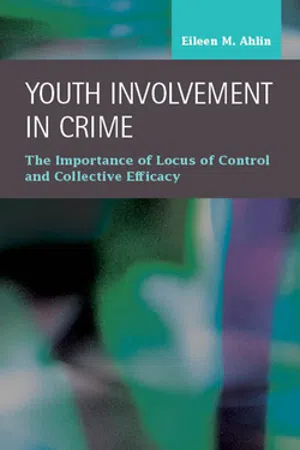
- English
- PDF
- Available on iOS & Android
About this book
Ahlin uses data from the Project on Human Development in Chicago Neighborhoods to examine the independent relationships between locus of control and collective efficacy and youth involvement in crime. She also explores the moderating effect of collective efficacy on the relationship between locus of control and crime. Findings suggest that increased locus of control inhibits criminal activity among youth, while collective efficacy does not influence individual-level criminal behavior. However, collective efficacy completely moderates the relationship between locus of control and crime; nullifying the influence of locus of control on crime. Her results suggest that while locus of control influences criminal behavior, neighborhood influences are not essential to understanding individual level involvement in crime.
Frequently asked questions
- Essential is ideal for learners and professionals who enjoy exploring a wide range of subjects. Access the Essential Library with 800,000+ trusted titles and best-sellers across business, personal growth, and the humanities. Includes unlimited reading time and Standard Read Aloud voice.
- Complete: Perfect for advanced learners and researchers needing full, unrestricted access. Unlock 1.4M+ books across hundreds of subjects, including academic and specialized titles. The Complete Plan also includes advanced features like Premium Read Aloud and Research Assistant.
Please note we cannot support devices running on iOS 13 and Android 7 or earlier. Learn more about using the app.